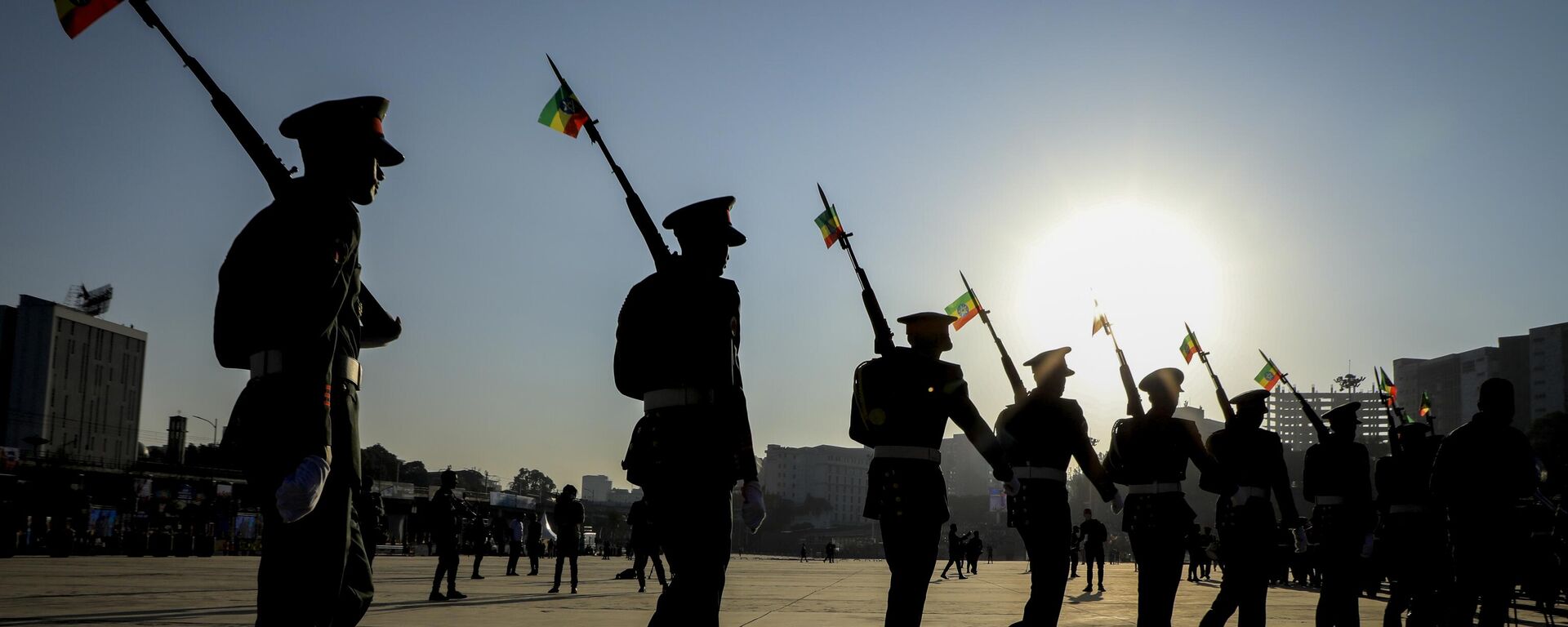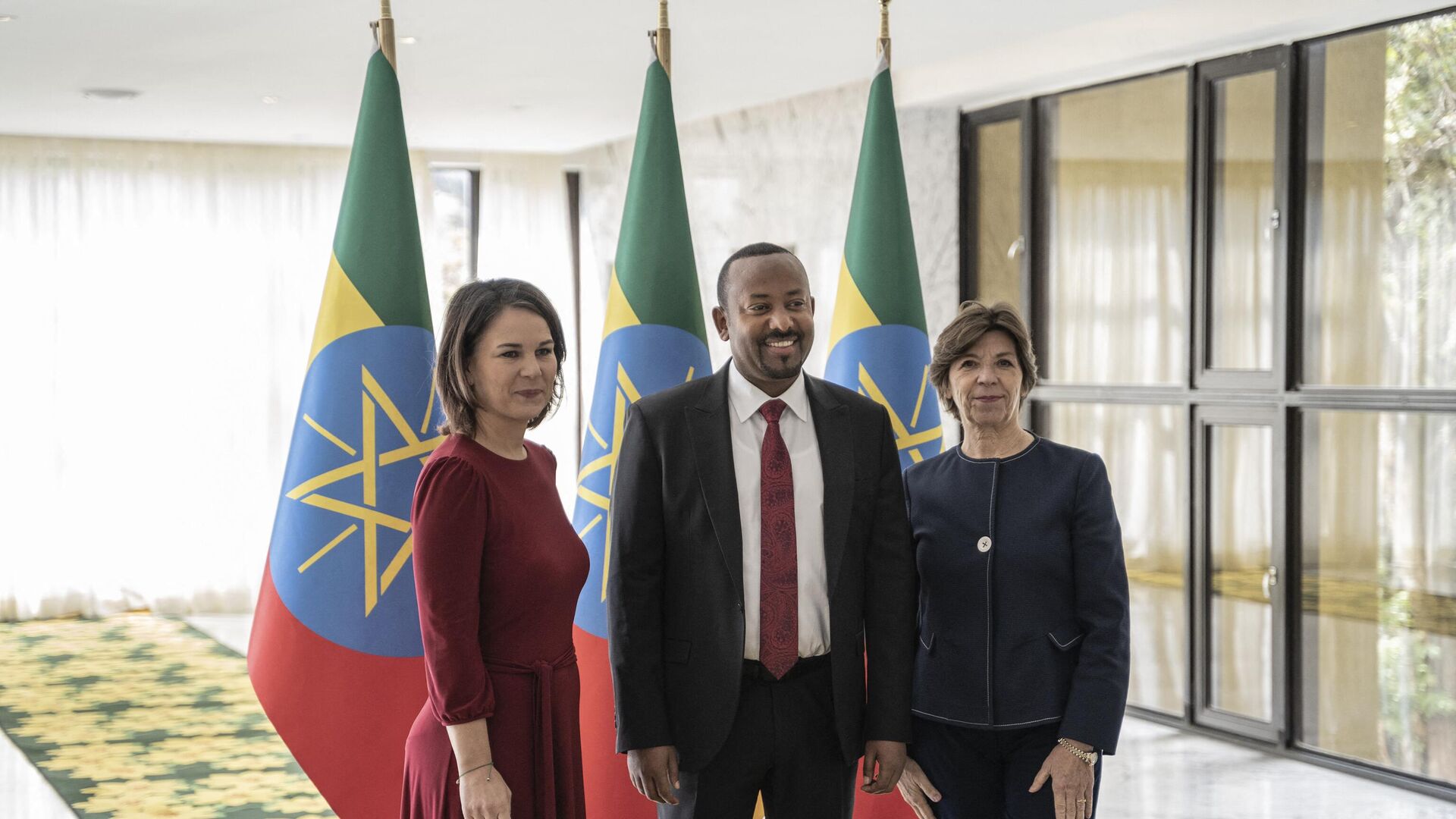https://sputnikglobe.com/20230114/french--german-fms-welcome-good-progress-under-peace-deal-in-ethiopia-1106318372.html
French & German FMs Welcome 'Good Progress' Under Peace Deal in Ethiopia
French & German FMs Welcome 'Good Progress' Under Peace Deal in Ethiopia
Sputnik International
French and German foreign ministers have praised the implementation of the peace agreement in Tigray, speaking at a press conference during their joint visit to Addis Ababa, Ethiopia’s capital.
2023-01-14T14:44+0000
2023-01-14T14:44+0000
2023-01-14T14:44+0000
africa
east africa
horn of africa
ethiopia
tplf (tigray people's liberation front)
tigray forces
peace deal
european union (eu)
france
germany
https://cdn1.img.sputnikglobe.com/img/07e7/01/0e/1106315462_0:0:3073:1728_1920x0_80_0_0_023897a4dfe4f51f753b9d5d2443a9f3.jpg
The French and German foreign ministers have praised the implementation of the peace agreement in Tigray, speaking at a press conference during their joint visit to Addis Ababa, Ethiopia’s capital.French Foreign Minister Catherine Colonna and her German counterpart Annalena Baerbock arrived in Addis Ababa on Thursday to show their support for the peace process in the region and enhance relations between the EU and the African Union. This is the first time since the peace deal that EU foreign ministers visit Ethiopia.During their two-day visit, the senior European diplomats met with Prime Minister Abiy Ahmed and held meetings with other Ethiopian ministers, as well as AU officials.At the press conference, they commended the "good progress" in the implementation of the peace agreement, saying that Europe encourages it to continue, as it has already resulted in the resumption of supply of humanitarian aid to the Tigray region, and the rebels surrendering their heavy weapons. Their trip to Ethiopia took place shortly a day after the forces of the Tigray People's Liberation Front (TPLF) in the town of Agulae, around 30 kilometers northeast of Tigray's regional capital Mekelle, began handing over their heavy weaponry as part of the peace deal. The ministers also called for accountability for the widespread abuses that took place during the conflict, saying it is the main condition for the EU to normalize relations with Ethiopia. They asked to establish a transitional justice mechanism to investigate the abuses and punish all those involved. During the trip, Colonna and Baerbock visited the World Food Program's distribution center in Adama, located 99 km southeast of the capital, which holds 50,000 tons of recently shipped wheat. The grain is expected to be distributed to the regions that were affected by the conflict the most, where a humanitarian crisis occurred, with people suffering from food shortages due to the disruption in aid supplies. Speaking about relations between Europe and African nations in general, the ministers highlighted that their countries fully support the suggestion to provide Africa with "two permanent seats in the security council" of the United Nations. They elaborated that it will enhance the continent's bilateral ties with other regions, and in particular with European countries, on security issues. The conflict between the Ethiopian government and the TPLF started in November 2020, when it began an uprising in the Tigray region, rejecting the federal government's policies. It resulted in numerous human losses, with people being forced to leave their homes, and caused a severe humanitarian crisis as people in the affected areas faced extreme poverty, starvation, and deadly disease.The peace agreement signed in November, which provided for an immediate cessation of hostilities in Tigray, eased the path for humanitarian aid and allowed for the gradual return of public services, including banking, communications, electricity, and fuel.
https://sputnikglobe.com/20230111/heavy-weapons-handover-begins-in-ethiopias-tigray-as-part-of-au-led-peace-process-1106215294.html
africa
east africa
horn of africa
ethiopia
france
germany
Sputnik International
feedback@sputniknews.com
+74956456601
MIA „Rossiya Segodnya“
2023
News
en_EN
Sputnik International
feedback@sputniknews.com
+74956456601
MIA „Rossiya Segodnya“
Sputnik International
feedback@sputniknews.com
+74956456601
MIA „Rossiya Segodnya“
european union, france, germany, ethiopia, tigray, addis ababa, ethiopia’s capital, african union, peace deal
european union, france, germany, ethiopia, tigray, addis ababa, ethiopia’s capital, african union, peace deal
French & German FMs Welcome 'Good Progress' Under Peace Deal in Ethiopia
The European Union suspended its financial support for Ethiopia following the outbreak of a civil conflict in the country's northern Tigray region, which erupted in November 2020. A peace agreement was signed by the Ethiopian government and Tigray rebels on November 2, 2022, ending two years of hostilities and bringing peace to the war-torn nation.
The French and German foreign ministers have praised the implementation of the peace agreement in Tigray, speaking at a press conference during their joint visit to Addis Ababa, Ethiopia’s capital.
French Foreign Minister Catherine Colonna and her German counterpart Annalena Baerbock arrived in Addis Ababa on Thursday to show their support for the peace process in the region and enhance relations between the EU and the African Union. This is the first time since the peace deal that EU foreign ministers visit Ethiopia.
During their two-day visit, the senior European diplomats met with
Prime Minister Abiy Ahmed and held meetings with other Ethiopian ministers, as well as AU officials.
They traveled to Addis Ababa “to do three things: explore with authorities on how to support the country on its way to lasting peace and accountability for human rights abuses, discuss food security in the Horn of Africa and strengthen Europe’s partnership with the African Union,” Germany's Baerbock said.
At the press conference, they commended the "good progress" in the implementation of the peace agreement, saying that Europe encourages it to continue, as it has already resulted in the resumption of supply of
humanitarian aid to the Tigray region, and the rebels surrendering their heavy weapons.
“Hostilities have ceased, aid has been able to reach the regions which had not received it […] a return of arms [by rebels] has begun,” the French minister stated.
Their trip to Ethiopia took place shortly a day after the forces of the Tigray People's Liberation Front (TPLF) in the town of Agulae, around 30 kilometers northeast of Tigray's regional capital Mekelle, began
handing over their heavy weaponry as part of the peace deal.

11 January 2023, 08:30 GMT
The ministers also called for accountability for the widespread abuses that took place during the conflict, saying it is the main condition for the EU to normalize relations with Ethiopia. They asked to establish a transitional justice mechanism to investigate the abuses and punish all those involved.
During the trip, Colonna and Baerbock visited the World Food Program's distribution center in Adama, located 99 km southeast of the capital, which holds 50,000 tons of recently shipped wheat. The grain is expected to be distributed to the regions that were affected by the conflict the most, where a
humanitarian crisis occurred, with people suffering from food shortages due to the disruption in aid supplies.
Speaking about relations between Europe and African nations in general, the ministers highlighted that their countries fully support the suggestion to provide Africa with "two permanent seats in the security council" of the United Nations. They elaborated that it will enhance the continent's bilateral ties with other regions, and in particular with European countries, on security issues.
The conflict between the Ethiopian government and the TPLF started in November 2020, when it began an uprising in the Tigray region, rejecting the federal government's policies. It resulted in numerous human losses, with people being forced to leave their homes, and caused a severe humanitarian crisis as people in the affected areas faced extreme poverty, starvation, and deadly disease.
The peace agreement signed in November, which provided for an immediate cessation of hostilities in Tigray, eased the path for humanitarian aid and allowed for the
gradual return of public services, including banking, communications, electricity, and fuel.



